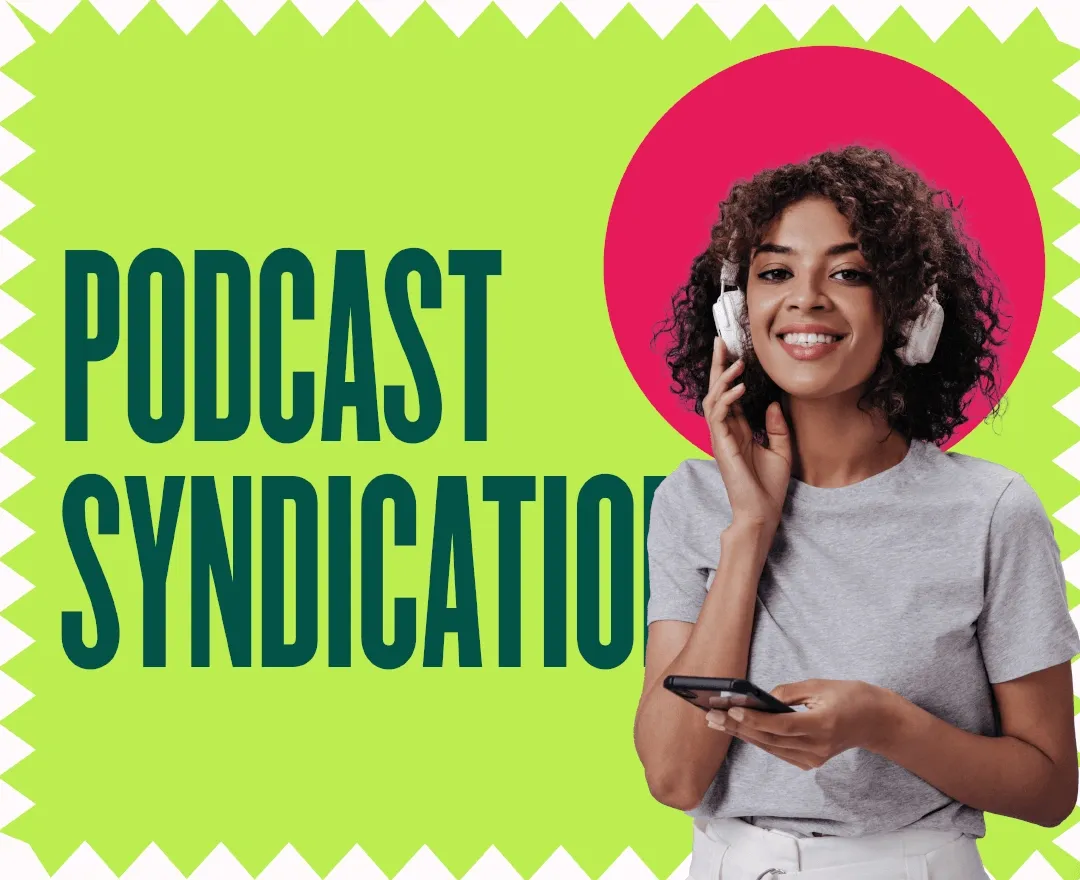Podcast syndication is the only method to make your show available to large audiences. It helps publish your shows on different platforms, increasing brand awareness and podcast listenership. If you don't use podcast syndication, you can make your show available only on one source — for most starter podcasters, it’s the website. However, once your podcasting portfolio gets rich with at least 2-3 new episodes, you don't want to stop there. As any podcaster, you want to promote your show to thousands, or even millions of new listeners.
So, here arises a question:
Isn't it better to publish your podcast on platforms where there are already millions of podcast listeners, Instead of gradually growing your website's traffic to get a bigger podcast audience?
It's undoubtedly better, and that's why you need to learn podcast syndication. It's a critical element of the whole podcast distribution infrastructure. So, let's fill in any gaps you have about it.
What is podcast syndication?
Podcast syndication is the process where the podcasters allow other parties to distribute their show. It can be described as an official agreement between the podcast creator and podcast distributors to display the show on different platforms.
How does syndication work?
A few key elements make podcast syndication possible; podcast hosts, RSS feeds, and podcast directories.
Podcast host
Podcast hosting is the space on the net where you can save your audio content for distributing it through different channels later. Your podcast hosting should be of high quality to ensure your files are not lost and are properly displayed to listeners. When choosing a podcast hosting service for you, make sure it has enough storage space, provides you with robust analytics on your show's performance, and has a responsive support system to assist you during unexpected breakdowns. Buzzsprout, Captivate, and Transistor are some of the top podcast hosts used by most podcasters. For more detailed instructions on choosing and working with podcast hosting, switch to our complete guide.
RSS feeds
Most podcast hostings automatically provide you with an RSS feed, which is nothing more than a list of all your podcast episodes uploaded to your podcast host. RSS feeds are connected to different podcast platforms, so every time you publish a new episode in your podcast hosting, it's automatically distributed across all your desired channels.
There are public, and private RSS feeds.
Public feeds are free for podcast listeners. If you distribute your show through a public RSS feed, listeners will stream it free of charge. If you want to go the extra mile and introduce premium paid content, you should use private RSS feeds. Those feeds are with restricted access and allow content streaming only for subscribed users.
Podcast directories
Podcast directories are the endpoint of podcast syndication. It's where your listeners get your show and can stream it online or download it to listen to it later.
There are plenty of podcast directories out there, among which we recommend you use Apple Podcasts, Google Podcasts, and Spotify in the first place. This trio is leading the industry based on the number of listeners and convenience of usage.
However, if you don't want to get limited with these options only, we've prepared a larger list of popular directories for you.
Where else to use podcast syndication?
Though the traditional way of podcast publishing goes through podcast directories, there are many other mediums you can share your podcast to. Below, let's discuss the most popular options.
Youtube
Although YouTube is considered mainly a musical platform, it's also a popular podcast syndication medium. Estimates show YouTube attracts 47% of all music listeners worldwide. Therefore, you shouldn't miss the opportunity to showcase your podcast in front of such a large audience. You don't necessarily have to prepare video content to publish a podcast on YouTube. Many Podcasters create static podcast graphics to accompany the whole show. Also, to publish a show on YouTube, you should convert the audio files into a video file, as YouTube does not accept the audio format. For a more detailed guide, check our article on YouTube podcasts.
Podcast networks
Joining a podcast network will grant you numerous opportunities, including wider reach for your show and more monetization opportunities. Podcast networks are like music labels for artists. Podcasters sign a collaboration contract and outsource the brand management and promotion activities to the network. Podcast networks inevitably take a portion of independent decision-making from podcasters. In addition, the generated income from shows' listenership and advertising is shared with network members.
However, if you're doing your first steps in the podcasting world, those sacrifices are completely justified, considering the instant popularity you will get in return. Podcast networks help you distribute your show to more channels in less time than you would do it alone.
Social Media
Last but not least, do not underestimate the importance of social media. Hook your followers with engaging posts introducing your podcast episodes between their scrolls.
You can use two main types of social posts to attract listeners from social platforms:
- Short fragments of your podcasts accompanied by catchy visuals
- Posts without the podcast fragments but within the topic of your next episode
Modern technology allows you to integrate your podcasting accounts with social media seamlessly, and therefore, makes it easy to share your new episodes. For example, FeedPress automatically shares all the latest podcast episodes to the social media channels that you connect to the tool.
To sum up
The golden rule of increasing listenership is boosting your show's visibility on as many platforms as possible. The more often your podcast is seen by your potential listeners, the more are your chances to convert them to loyal listeners. In this regard, podcast syndication is the only and the best option to spread your content across different mediums, and the steps described in our guide will make it dead simple for you.






